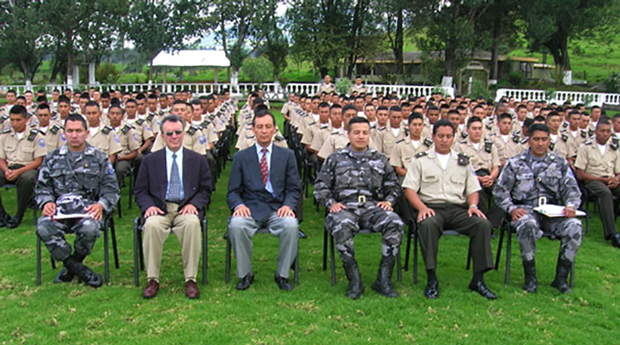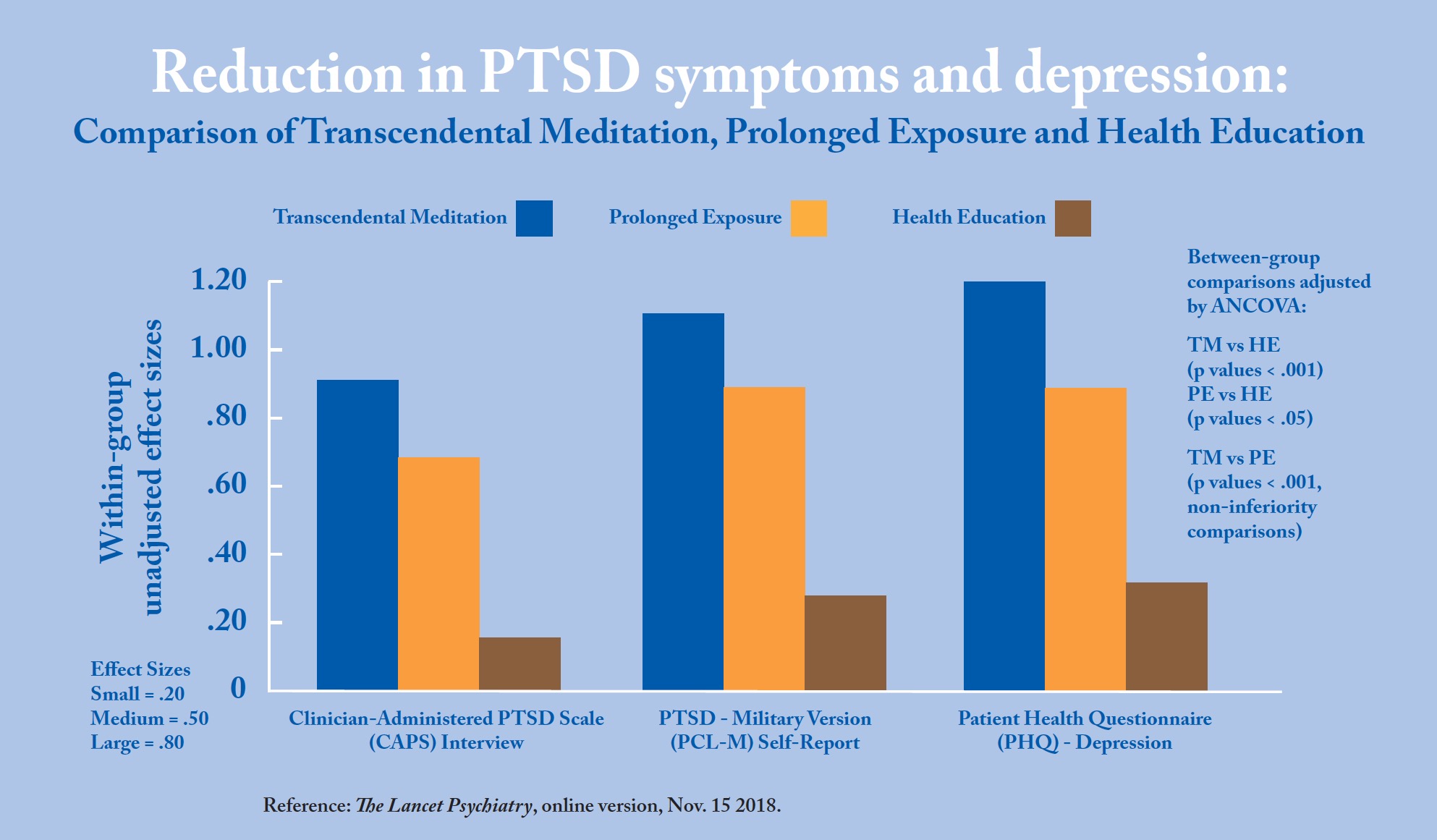

Research on the use of Transcendental Meditation to alleviate post traumatic stress disorder (PTSD) and increase resilience in military personnel
(The bracketed numbers refer to the research numbers in Enclosure 7 and 7b where the full references to the scientific research are given.)
One of the earliest studies on military personnel suffering from post-traumatic stress disorder (PTSD) was conducted on Vietnam War veterans suffering from the disorder. Over a three-month period, patients practising Transcendental Meditation showed clear-cut improvements in all aspects of the syndrome studied, with significant:
- decreases in depression, anxiety, insomnia, and alcohol consumption
- improvement in family problems
- reduced severity of delayed stress syndrome
- decreased emotional numbness
- reduced difficulty in obtaining employment.
In contrast, the control group who received standard treatment with psychotherapy showed no significant change on any measure [56].
These findings are corroborated by a study of US veterans with PTSD following exposure to moderate or heavy-moderate combat in the Iraq and Afghanistan wars. After eight weeks’ practice of Transcendental Meditation, subjects showed a 50% reduction in symptoms of PTSD, including decreased stress and depression, and marked improvements in relationships and overall quality of life [401]. In another study, American active-duty military service members with PTSD or anxiety who practised TM showed reduced medication usage and an overall decrease in the severity of psychological symptoms compared to controls [426].
Case studies have also indicated the feasibility of providing TM training to active-duty soldiers with PTSD in US Defense Department medical facilities, including those with traumatic brain injury, depression, or substance abuse. Practice of TM was associated with reduction in distress and PTSD symptoms, and improvement in social role performance [418].
These findings are supported by two published studies on resilience. The first is a survey of potential approaches to improving soldier resilience which concluded that Transcendental Meditation had its most supporting evidence across five domains of resilience: physical, emotions, spiritual, social and family life [419].
The second is a study of new recruits at Norwich University (USA), which found a significant increase in resilience after 2 months practice of Transcendental Meditation [450] – see following case study
Case study at Norwich University, USA
Norwich University conducted a test where it randomly assigned incoming ‘rookies’ (new students) to a meditating platoon (practising Transcendental Meditation) and a non-meditating platoon. President Richard Schneider, Rear Admiral USCGR (Ret.), recalls that ‘within four or five weeks, the kids who didn’t get the training were complaining that the other kids had an advantage over them.’ Within 90 days, the platoon that learned TM was outperforming the control platoon in every measurable functional area.
These results were substantiated by psychological and neurophysiological tests conducted by the faculty at Norwich. The research found significant reductions in depression, anxiety, and stress in the TM platoon and significant increases in constructive thinking, behavioural coping and resilience [450]. This study was replicated in the next year at Norwich and the same results were found.
Current research by US Department of Defense
In 2012 the US Department of Defense granted the Maharishi University of Management Research Institute and the San Diego Veterans Administration Medical Centre $2.4 million to further research the effectiveness of using TM to treat PTSD. In this randomised controlled trial of 203 veterans with documented PTSD, participants were randomly assigned to one of three treatment groups:
- Transcendental Meditation
- Prolonged Exposure (PE) (The gold-standard treatment for PTSD)
- Health education control group
The results of the study were published in The Lancet Psychiatry (15 November 2018).
The graph below shows the improvement in overall PTSD symptoms and depression for eachgroup after three months.

The randomised controlled trial assigned 203 veterans at the Veterans Administration San Diego Healthcare System to prolonged exposure (PE), Transcendental Meditation (TM), or health education (HE) control groups. Each treatment provided 12 sessions over 12 weeks, with daily home practice. The objective of the study was to compare TM to Prolonged Exposure in a non-inferiority trial and to compare both to health education. The study measured change in PTSD symptoms over three months with the clinically administered PTSD Scale (CAPS), change in responses to a self report checklist (PCL-M), and changes on a patient health questionnaire (PHQ -9 Depression).
The findings indicated significant reductions in PTSD symptoms and depression for the TM group compared to HE; and ‘non-inferiority’ between TM and PE, indicating that TM was comparable to PE in reducing PTSD symptoms and depression.
A ‘non-inferiority’ trial is a technical design used to compare a new treatment (in this case Transcendental Meditation) with a well-accepted, ‘gold-standard’, best-of-its-kind treatment.
Further findings showed that the percentage of participants with clinical meaningful improvement in the Transcendental Meditation group was 61%, compared with 42% in the prolonged exposure group, and 32% in the health education group.
Dr Sanford Nidich, the principal investigator of the study, commented that the veterans who learnt Transcendental Meditation had substantial decreases in the first month in trauma experiences and depression. This is very important in that the veterans have had PTSD in many cases longer than a decade or so, and had been through a number of treatments already and still had PTSD. So they were looking for relief and some immediate signs that the new treatment would have an effect. The effortless nature of TM is important, and also that the veterans can do TM and enjoy some immediate benefits within the first few days. It was quite common for those in the study to report ‘feel calmer’, ‘less stressed’, ‘easy and pleasant to do’. This was extremely important because the Department of Defense wanted to know if this kind of practice can be feasible in a military culture. All the veterans were able to practise TM. The drop-out rate was 38% in the prolonged exposure group and 20% in the TM group.
For contact details of your local Consciousness Development Consultant contact us HERE or phone 07805 572541